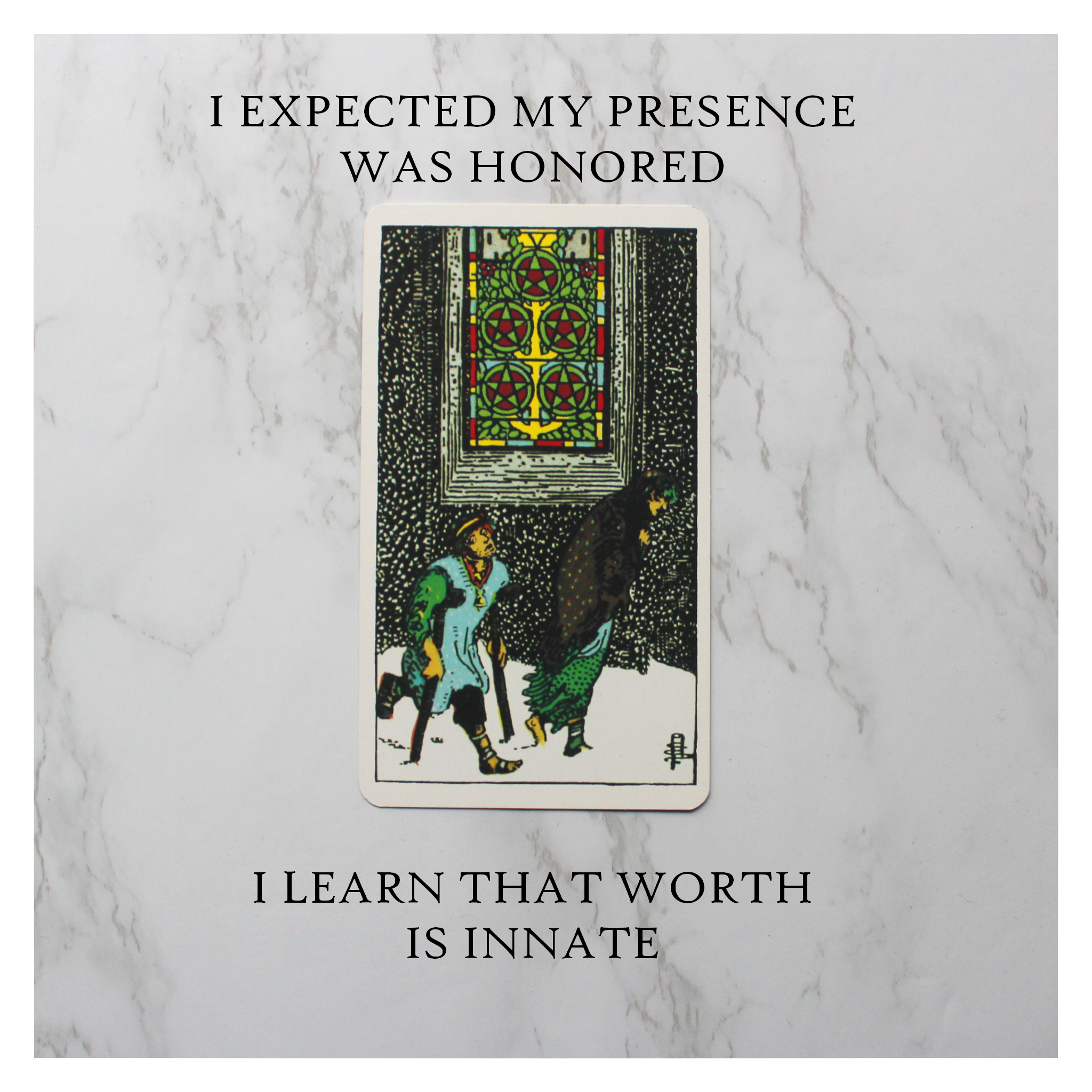THE FIVES - Tradition, Expectations, and the Value of Disruption
THE HIEROPHANT
The Hierophant was one of the cards that fought me when I first started with tarot, or perhaps, I fought it. It seemed to represent not only the toxicity of many archetypal masculine figures of power, but also the idea of organized religion which I was not so comfortable with. It took me a while to pick apart the fifth major, understand it from angles that had nothing to do with those characteristics that had scared me away.
The Hierophant to me, is about tradition. It is about the complicated relationship we have with patterns, and what happens when those patterns are not fulfilled. In some ways introducing that next step from the Emperor is upsetting. We think security and stillness will heal and fulfill, and it can. But sometimes change is what is needed.
The Hierophant is a caricature of patterns. It is a pit with no bottom. It is a marriage, a commitment to forever, fully knowing forever does not exist. Sometimes it is so beautiful to promise the eternal in a world that is explicitly finite. Other times, it can seem silly or plain ignorant. Context is key.
⛤ ⛤ ⛤ ⛤ ⛤ ⛤ ⛤ ⛤ ⛤ ⛤ ⛤ ⛤ ⛤ ⛤ ⛤ ⛤ ⛤ ⛤ ⛤ ⛤ ⛤ ⛤ ⛤ ⛤ ⛤ ⛤ ⛤ ⛤ ⛤ ⛤ ⛤ ⛤ ⛤ ⛤ ⛤ ⛤ ⛤ ⛤ ⛤ ⛤ ⛤ ⛤ ⛤ ⛤ ⛤ ⛤ ⛤ ⛤
SWORDS
The Five of Swords is a visually challenging card for me. This imagery of both success and failure, gain and loss, makes it hard to pin down the meaning. I have read this card as a card of confidence, and of humbling moments. I have read it as a card of righteous decision, and one of mistaken assumption. Even the sky looks as though it can be inverted, the clouds so jagged the sky looks fragmented.
This is the beauty of this card: duality. The idea that for every observation we take for granted, the experience is completely different for others. Truth is seen as objective, but the very nature of the logic, thought, and action of the swords is that they come from an individual. The consequences of your actions are subjective, and impact more than just your allegiance to truth.
This card heals our assumption that our truth is everyone's truth. It introduces the element of opposition, which encourages us to understand our own convictions. From that understanding, we can begin to acknowledge what is rigid and what is mutable. Where are we open to change? What would we defend with all our might? In confrontation, a failure only happens when our truth is proven to be subjective, and we retreat in denial. Opening our mind to the possibility that things are more complex than we knew is healing to limiting thoughts and actions.
⛤ ⛤ ⛤ ⛤ ⛤ ⛤ ⛤ ⛤ ⛤ ⛤ ⛤ ⛤ ⛤ ⛤ ⛤ ⛤ ⛤ ⛤ ⛤ ⛤ ⛤ ⛤ ⛤ ⛤ ⛤ ⛤ ⛤ ⛤ ⛤ ⛤ ⛤ ⛤ ⛤ ⛤ ⛤ ⛤ ⛤ ⛤ ⛤ ⛤ ⛤ ⛤ ⛤ ⛤ ⛤ ⛤ ⛤ ⛤
CUPS
The Five of Cups is the card I felt most confident with out of the fives. The imagery feels clear. Loss is impacting us, but in our grief we turn away from what we have. But I also felt something a little less literal in this scene. Perhaps it is not physical things or concrete comfort we have left beside us, but rather the emotional value that loss can bring.
It is a dangerous trap to believe that certain emotions are "good" and others "bad". We are taught that grief, anger, and many other "negative" emotions breed violence, selfishness, and isolation. Though we can take these actions if we choose, the emotions themselves are not bad, and they should not be avoided. Experiencing other emotions beyond "happy" is wholesome. It allows us to move through change responsibly, instead of denying our own growth and contractions.
When we experience a subversion of our expected contentment, we may feel we have failed at being happy. We mistakenly believe that happiness is the ideal state, when really we need ALL emotions to thrive. The cups don't just represent happiness, they represent ALL emotions. So even in this painful moment, we must feel. We must love our capacity to recognize the value of what we lose, and to yearn for a future where we are emotionally prosperous.
⛤ ⛤ ⛤ ⛤ ⛤ ⛤ ⛤ ⛤ ⛤ ⛤ ⛤ ⛤ ⛤ ⛤ ⛤ ⛤ ⛤ ⛤ ⛤ ⛤ ⛤ ⛤ ⛤ ⛤ ⛤ ⛤ ⛤ ⛤ ⛤ ⛤ ⛤ ⛤ ⛤ ⛤ ⛤ ⛤ ⛤ ⛤ ⛤ ⛤ ⛤ ⛤ ⛤ ⛤ ⛤ ⛤ ⛤ ⛤
COINS
The Five of Coins is probably the card I have had the most trouble with in the fives. The traditional imagery is so destitute, so full of sorrow. There is so much wisdom in the intersection of coins and The Hierophant, and so it upsets me to see this card pretty exclusively seen as a card of abandonment and hopelessness. This is one of a few SRW images that I don't think resonates well with a modern tarot reader (another is the six of coins, making a card of reciprocity look like classist charity, but i digress).
The trouble with the subversion of tradition and expectations in the coins is that it often means complete upheaval of your foundation. It is hard to shake up the "rigid" suits like coins and swords, and still maintain a positive attitude. And yet, when I created the fifth major in The Crux, I chose to feature a wand and a coin on the card. Why? Because foundation is intrinsically tied to and transformation. Tradition and change are their own duality that honors and contradict itself eternally. So this card, which at first seems a "worst case scenario" is actually an honorable and sacred part of our journey. It is a moment that is challenging, yes, but one that is necessary.
When we discover that our value as a unique person is not valued by our foundational relationships and institutions, it can shatter our personal sense of value. In many cases, we are cast away from the warmth of that acceptance over our diversity, our voice, our unique path. But in some ways I see a more insidious picture than this one. There is a person in that church right now who has heard that they are condemned, who is now silently suffering. Those who have been cast away are no better than the person inside, however they do possess a freedom the other does not.
It takes moments like these often times to remind us that no structure outside of us determines our worth. No one can tell you you are wrong. And when we internalize these statements of manipulation and ignorance as truth, we become an enemy to our own prosperity and happiness. The people around us have a responsibility to treat us with the respect and care we deserve, and we have a responsibility to (within our power) hold boundaries to ensure we only let respectful and caring people close.
This card is a symbol of that shakeup that often demands a sense of responsibility. Suddenly we are forced to care for our own wounds, and come to the conclusion that we are worth that care regardless of who disagrees. You may never be congratulated on pushing through the challenge and pain to a happier healthier you. Others may not honor that work, and the value you bring just by existing. You have to see your own work, and congratulate yourself.
Despite all this, I don't think the five of coins is a lonely card. It often happens while you are isolated, but it foreshadows heavily the coming of the sixes, a return to the community and relationships. This step teaches you who you really are, when all that is extraneous is stripped away. This prepares you for finding your community and reciprocal circles in the Six of Coins.
I think this is why so many people with marginalized identities (or at least in my observation) tend to feel a strong relationship with this card. It is a shadow teacher, a challenging friend, an ally that we don't like. It reminds us of trauma, of self-hate, but in reality it calls us inward to access a truth we long for: we are worthy.
⛤ ⛤ ⛤ ⛤ ⛤ ⛤ ⛤ ⛤ ⛤ ⛤ ⛤ ⛤ ⛤ ⛤ ⛤ ⛤ ⛤ ⛤ ⛤ ⛤ ⛤ ⛤ ⛤ ⛤ ⛤ ⛤ ⛤ ⛤ ⛤ ⛤ ⛤ ⛤ ⛤ ⛤ ⛤ ⛤ ⛤ ⛤ ⛤ ⛤ ⛤ ⛤ ⛤ ⛤ ⛤ ⛤ ⛤ ⛤
WANDS
The Five of Wands is honestly one of the most intuitive five cards for me. Though at first glance it portrays a sense of struggle and conflict, there is a deeper truth. All the people on the card are on equal ground, without any advantage over the other. Each of the figures are clothed in different garments, all looking in different directions. This is a card of variance, of difference. This is a card of diversity.
Recall when I explained the reasoning behind including a wand and a coin on the fifth major arcana card in The Crux Tarot? Here is where the other shoe drops. Where coins are struggling with upheaval, wands confront a grounding truth. Similar to the swords, but distinct in it's perspective, the wands deal with confronting the truth that your perspective is not the only truth. But here, with the wands, we are less concerned about personal truth, and more about passion, desire, creativity.
The five of wands shows what I like to call constructive contrast. The figures "fight" but it is like a play. There is no intent to kill or harm really, it might as well be a game. Practice for the reality of a complex world where we carry our passion and ideas like these wands, triumphant and proud. This is a group project made up only of the people who always end up doing the whole group project for the other partners. This is a dance battle, a competition. A friendly expression of what we believe in strongly, in celebration of that belief.
Of course, this has the potential to cause frustration. At this point in the wands we are well versed in chasing the desires we have. When we introduce these ideas to the world, the presence of other people's projects and ideas can change our perspective. Suddenly we are not on a island of our own. We have to consider the realities of our work. Constructive criticism can feel like an attack, but is it not an exercise in being vulnerable and transformative? This card asks us to take whatever this fiery part of us is to a writing circle, to read it out in front of the class. It asks us to listen to other people's words, watch the others dance and sing and paint and scream. To take it all in, and see the way it reflects our own spirit. Do we like what we see in our community? Does vulnerability feel dangerous? How can we learn to trust fall into the crowd of others who are similarly scared? How can we feel the value of diverse perspectives?
⛤ ⛤ ⛤ ⛤ ⛤ ⛤ ⛤ ⛤ ⛤ ⛤ ⛤ ⛤ ⛤ ⛤ ⛤ ⛤ ⛤ ⛤ ⛤ ⛤ ⛤ ⛤ ⛤ ⛤ ⛤ ⛤ ⛤ ⛤ ⛤ ⛤ ⛤ ⛤ ⛤ ⛤ ⛤ ⛤ ⛤ ⛤ ⛤ ⛤ ⛤ ⛤ ⛤ ⛤ ⛤ ⛤ ⛤ ⛤





